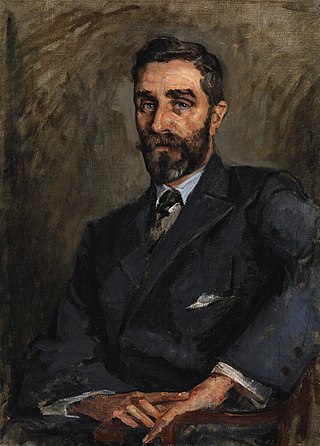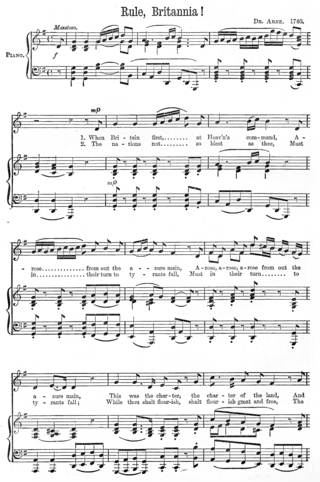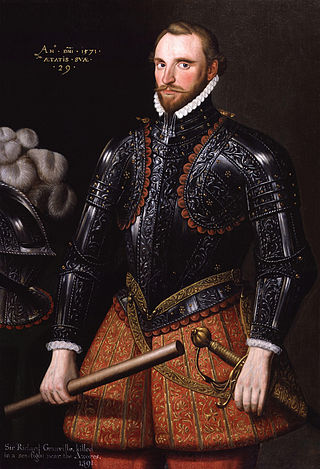
Roger David Casement, known as Sir Roger Casement, CMG, between 1911 and 1916, was a diplomat and Irish nationalist executed by the United Kingdom for treason during World War I. He worked for the British Foreign Office as a diplomat, becoming known as a humanitarian activist, and later as a poet and Easter Rising leader. Described as the "father of twentieth-century human rights investigations", he was honoured in 1905 for the Casement Report on the Congo and knighted in 1911 for his important investigations of human rights abuses in the rubber industry in Peru.

Gráinne O'Malley, also known as Grace O'Malley, was the head of the Ó Máille dynasty in the west of Ireland, and the daughter of Eóghan Dubhdara Ó Máille.

"Rule, Britannia!" is a British patriotic song, originating from the 1740 poem "Rule, Britannia" by James Thomson and set to music by Thomas Arne in the same year. It is most strongly associated with the Royal Navy, but is also used by the British Army.

Sir Richard Grenville, also spelt Greynvile, Greeneville, and Greenfield, was an English privateer and explorer. Grenville was lord of the manors of Stowe, Cornwall and Bideford, Devon. He subsequently participated in the plantations of Ireland specifically the Munster plantations, the English colonisation of the Americas and the repulse of the Spanish Armada.

"This Land Is Your Land" is a song by American folk singer Woody Guthrie. One of the United States' most famous folk songs, its lyrics were written in 1940 in critical response to Irving Berlin's "God Bless America". Its melody is based on a Carter Family tune called "When the World's on Fire". When Guthrie was tired of hearing Kate Smith sing "God Bless America" on the radio in the late 1930s, he sarcastically called his song "God Blessed America for Me" before renaming it "This Land Is Your Land".
"I Vow to Thee, My Country" is a British patriotic hymn, created in 1921 when music by Gustav Holst had a poem by Sir Cecil Spring Rice set to it. The music originated as a wordless melody, which Holst later named "Thaxted", taken from the "Jupiter" movement of Holst's 1917 suite The Planets.
Chidiock Tichborne, erroneously referred to as Charles, was an English conspirator and poet.

"Sir Patrick Spens" is one of the most popular of the Child Ballads, and is of Scottish origin. It is a maritime ballad about a disaster at sea.

"The Bonnie Blue Flag", also known as "We Are a Band of Brothers", is an 1861 marching song associated with the Confederate States of America. The words were written by the entertainer Harry McCarthy, with the melody taken from the song "The Irish Jaunting Car". The song's title refers to the unofficial first flag of the Confederacy, the Bonnie Blue Flag. The left flag on the sheet-music is the Bonnie Blue Flag.

Banna Strand, also known as Banna Beach, is a beach in North Kerry, Ireland. It is an Atlantic Ocean beach extending from the Smallrock and Blackrock in the North to Carrahane at its southern edge. It is around 12 kilometres (7 mi) north west of Tralee. It features shifting sand dunes along its entire length which rise up to 12 metres (40 ft). Carrahane lagoon on the south end, famous for migrating birds and the Roger Casement landing. The mountains of the Dingle Peninsula can be seen on the south west horizon. Many residents from Tralee make a trip to Banna Strand on the warmest summer days.

The Larne gun-running was a major gun smuggling operation organised in April 1914 in Ireland by Major Frederick H. Crawford and Captain Wilfrid Spender for the Ulster Unionist Council to equip the Ulster Volunteer Force. The operation involved the smuggling of almost 25,000 rifles and between 3 and 5 million rounds of ammunition from the German Empire, with the shipments landing in Larne, Donaghadee, and Bangor in the early hours between Friday 24 and Saturday 25 April 1914. The Larne gun-running may have been the first time in history that motor-vehicles were used "on a large scale for a military-purpose, and with striking success".

Jamil Abdul Latif el-Banna, born 28 May 1962, is a Jordanian of Palestinian origin, with refugee status in the United Kingdom, who had been living in north-west London. He was abducted in November 2002 by the CIA from the Gambia while on a business trip, and suffered extraordinary rendition to Bagram, Afghanistan, where he was held and interrogated by the CIA until March 2003. He was transferred to military custody at Guantanamo Bay detainment camp in March 2003, and held there until 19 December 2007.
"Over the Hills and Far Away" is a traditional British song, dating back to at least the late 17th century. Two versions were published in the fifth volume of Thomas D'Urfey's Wit and Mirth, or Pills to Purge Melancholy; a version that is similar to the second Wit and Mirth one appears in George Farquhar's 1706 play The Recruiting Officer. A further version appears in John Gay's The Beggar's Opera of 1728.
"Little Armalite" is an Irish rebel song which praises the Armalite AR-18 rifle that was widely used by the Provisional Irish Republican Army (IRA) as part of the paramilitary's armed campaign in Northern Ireland during the Troubles. One recording of the song, by Wolfhound, was released on 7" in 1975.
"Skibbereen", also known as "Dear Old Skibbereen", "Farewell to Skibbereen", or "Revenge For Skibbereen", is an Irish folk song, in the form of a dialogue wherein a father tells his son about the Irish famine, being evicted from their home, and the need to flee as a result of the Young Ireland rebellion of 1848.
"Back Home in Derry" is an Irish rebel song written by Bobby Sands while imprisoned in HM Prison Maze.

SS Libau was a merchant steam ship. In 1916 she was disguised with the identity of a Norwegian vessel named the SS Aud in an attempt to carry arms from Germany to Ireland as part of the preparation for the Easter Rising.
John Locke (1847–1889) was an Irish writer and Fenian activist, exiled to the United States, and most famous for writing "Dawn on the Irish Coast", also known as "The Exiles Return, or Morning on the Irish coast".
The Howth gun-running was the smuggling of 1,500 Mauser rifles to Howth harbour for the Irish Volunteers, an Irish nationalist paramilitary force, on 26 July 1914. The unloading of guns from a private yacht during daylight hours attracted a crowd, which prompted police and military forces to intervene. A riot ensued and the attempt to seize the weapons was unsuccessful. As the King's Own Scottish Borderers returned to barracks, they were accosted by a mob at Bachelors Walk, who threw stones and exchanged insults with the soldiers. In an event later termed the Bachelor's Walk massacre, the soldiers shot into the crowd, resulting in the deaths of four civilians and the wounding of at least 38.

"One Less Lonely Girl" is a song by Canadian singer Justin Bieber. It was written and produced by Ezekiel Lewis and Balewa Muhammad of The Clutch, and Sean Hamilton, John "J.R." Harris and Hyuk Shin of the production team A-Rex. The song was released exclusively to iTunes as the second single from his debut release, My World, on October 6, 2009, and was later released to more digital distributions and mainstream and rhythmic radio soon after.











